Six sets of twins all born at Missouri hospital this week









LEE'S SUMMIT, MO -- Due to a remarkable coincidence, the maternity and neonatal intensive care unit at Saint Luke's East Hospital is twice as busy as usual this week caring for six sets of twins, reported ABC News.
The six sets of twin infants, all from different mothers, are doing well, said Brenda Cornell, a clinical nurse manager for the hospital. According to Cornell, the staff is enjoying the unusual situation.
"This is the first time we've ever had this many sets of twins in our hospital at the same time," Cornell said.
The timing of the twins' arrival is a coincidence and the result of some early and unexpected deliveries.
According to National Center for Health Statistics, twin births everywhere are on the rise. Prior to 1980, one in 50 babies born was a twin, amounting to about two percent of births. Twins now account for one in 30 babies, or 3.5 percent of births.
When researching the recent surge in twin births, Centers for Disease Control and Prevention found that women today are waiting longer to get pregnant, and older women are more likely to give birth to multiples. The rest of the spike can be attributed to the increased use of infertility treatments, the CDC report found.
Cornell told ABC News that none of the hospital's simultaneous twins were the result of infertility treatments, and there are probably more to come.
"Moms carrying twins from all over the community heard about this and now want to come here to deliver," she said.
ABC News contributed to this story.








